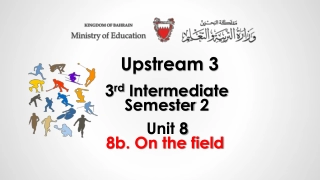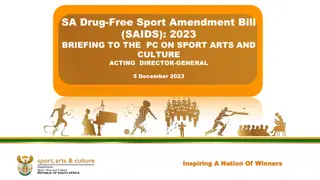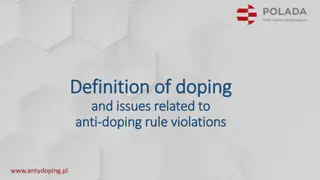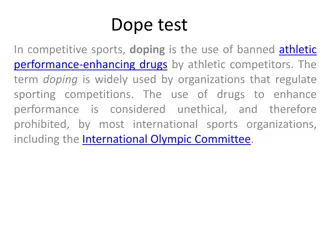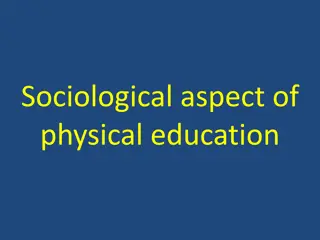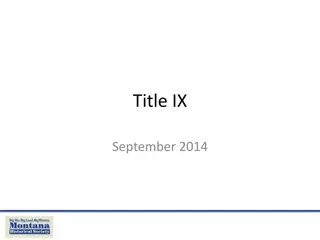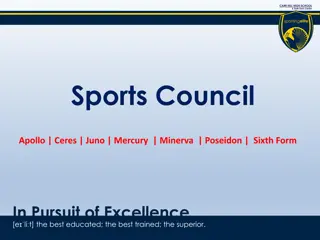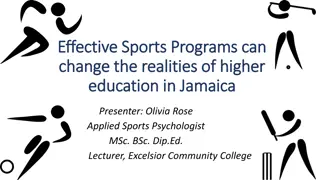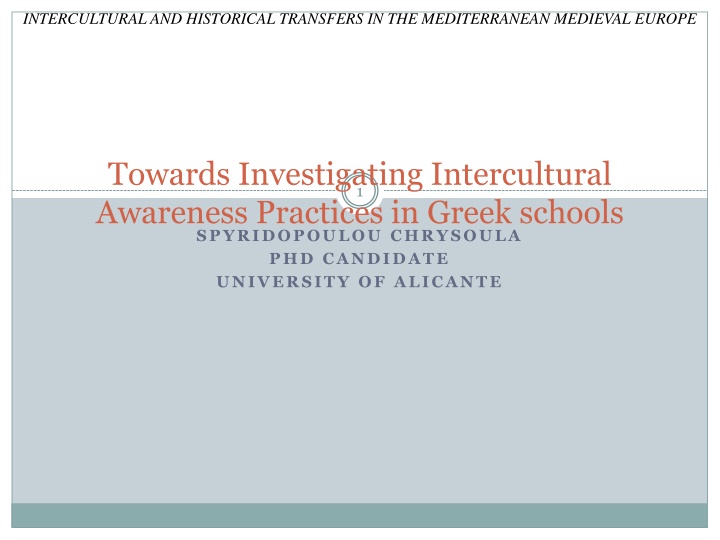
Doping in Sports: Effects, Consequences, and Anti-Doping Measures
This content explores the prevalence of doping in sports, its effects on both male and female athletes, examples of cases, and the importance of anti-doping measures to ensure fair play and athlete safety. It covers the reasons why athletes may choose to dope, the harmful effects of doping on health, and key principles of anti-doping practices. The content emphasizes the impact of doping on performance, physical health, and ethical considerations within the sporting world.
Download Presentation

Please find below an Image/Link to download the presentation.
The content on the website is provided AS IS for your information and personal use only. It may not be sold, licensed, or shared on other websites without obtaining consent from the author. If you encounter any issues during the download, it is possible that the publisher has removed the file from their server.
You are allowed to download the files provided on this website for personal or commercial use, subject to the condition that they are used lawfully. All files are the property of their respective owners.
The content on the website is provided AS IS for your information and personal use only. It may not be sold, licensed, or shared on other websites without obtaining consent from the author.
E N D
Presentation Transcript
INTERCULTURAL AND HISTORICAL TRANSFERS IN THE MEDITERRANEAN MEDIEVAL EUROPE Towards Investigating Intercultural Awareness Practices in Greek schools 1 SPYRIDOPOULOU CHRYSOULA PHD CANDIDATE UNIVERSITY OF ALICANTE
PURPOSE & OBJECT OF RESEARCH/ORIGINAL HYPOTHESIS 2 -Intercultural Education: long-debated issue in variable educational contexts around Europe -Purpose of research: Investigation of Greek Teacher s Intercultural Awareness Practices in class To what extent is the Greek State School Curriculum supportive for Intercultural Teaching? Are Greek teachers adequately trained to apply Intercultural Practices in class? Are Greek teachers open-minded enough to instill Intercultural Knowledge to their students? To what extent are Greek teachers Interculturally Sensitive and Aware, thus Interculturally Competent (IC)? To what extent do the state curricula and textbooks contribute to Intercultural Teaching? To what extent does the class composition assist Intercultural Teaching? -Original hypothesis: Greek teachers Intercultural Awareness Practices need further support
LITERATURE REVIEW 3 In-length Definition of Key Words: Intercultural Education, Intercultural Sensitivity, Intercultural Competence, Intercultural Awareness The multicultural character of Greece Historical Overview of Intercultural Studies in Medieval Europe The role of Greek curricula and textbooks to intercultural education -Teaching material: the case of Roma and Middle East refugees Weaknesses in the Greek intercultural educational system and suggestions for improvement Teachers -Parents role in multicultural/intercultural education The European intercultural class -Intercultural Education in Europe: The Greek Experience -The model of the European intercultural teacher -The Intercultural dimension in official European documents Comparative findings from other studies/Further suggestions for teachers training and intercultural lessons
SIGNIFICANCE OF THE RESEARCH 4 Respect for cultural diversity in the educational system, where teachers and students are deeply involved in a long term cooperation for a totally formed individual, socially, humanely, politically It is crucial to investigate what has been attained so far in the Greek educational system and what can be done more to amend problematic areas in Intercultural Teaching Intercultural Education policy has been a new notion that policymakers and other stakeholders in the field of education have to define Its implementation in schools so as to respond to Greece s diverse student population has been a hard endeavour Considerable increase in the influx of immigrants in Greek schools redefined the Greek educational system Coexistence of students of different backgrounds in class triggered new data to education Introduction of young teachers in education brought about new stances towards teaching and learning State funding of schools for new equipment fostered a new method of Intercultural Teaching approaches in schools The results of previous researches not only highlight gaps between government policy and school practice but also show that Greece has still a long way to go, to leave behind its ethnocentric image and fully implement Intercultural Education within all public schools, not only in the so-called Intercultural Schools
METHODOLOGY-RESEARCH DESIGN- INSTRUMENTATION 5 Objectivity, validity and reliability in research quantitative tools (questionnaires) Possible limitations to the generalization of the study: it is not always feasible to mould attitudes into numbers Participants have to develop a trusting attitude towards the researcher in terms of anonymity and confidentiality Respondents to the questionnaire were asked in the first part to provide some personal background data (demographic information) about their teaching experience, workplace, age, gender, education status, types of courses they teach, knowledge of foreign languages, geographical area their school is located in, any previous intercultural training and living or travelling abroad. In the second part, they were called to give responses to 20 items which clearly indicated their stances to encouraging intercultural practices in their lessons. A 5-point Likert scale (1 for strongly disagree and 5 for strongly agree) used to the questionnaire design: participants express how much they agree or disagree with a particular statement. Construction of the questionnaire based on two published articles in well-known educational Journals (Canadian Journal of Higher Education and English Language Teaching Journal) surveying that exactly topic of interculturalism in education. The researcher thought about and very carefully combined items of the two published sources in order to devise that exactly questionnaire which reflected -on the researcher s opinion- what they actually wanted to investigate, that is Greek teachers stances in class towards the application of intercultural practices. The devised scale was selected because it takes into account all of the dimensions of intercultural practices and measures intercultural sensitivity of any given group of people, thus that of Greek teachers. Its items address the purpose of the research successfully while its structure is reader-friendly for the respondent to answer. Pilot testing: researcher s experienced colleagues carefully selecting and constructing the number items by making minor changes in verbal form and structure. Items were eliminated, adapted, grouped and selected appropriately while they were ranked according to their significance and flow of answers. Consequently, items 1-14 were extracted and designed upon adaptation from the English Language Teaching Journal (Vol. 12, No. 1, 2019, pages 30-47) while items 15-20 were extracted and designed upon adaptation from the Canadian Journal of Higher Education (Vol. 44, No. 3, 2014, pages 86 103). Further analyses were carried out to evaluate the concurrent validity of the designed questionnaire with related measures and a 20-item questionnaire resulted. Participants answers reported on Google Drive databases, then extracted in form of tables and graphs (via SPSS software statistics programme) for further theoretical analysis
RESEARCH SAMPLE 6 Representative sample: Teachers of primary, secondary, tertiary education, public or private schools Results will be generalised to a wider target group of teachers (probability sampling in quantitative research) Geographical area chosen for the questionnaire is not specific (schools around the country where the researcher can have access)
KEY INTERCULTURAL NOTIONS 7 Intercultural Studies in the twenty-first century has been a modern educational concept in Social Sciences with lots of perspectives and parameters since education across the world tends to broaden its horizons connecting people of different origin, background, culture, religion, life perspective. Teachers are constantly trying to enrich students Intercultural Awareness throughout the learning process Intercultural understanding involves students learning to value and view critically their own cultural perspectives and practices and those of others through their interactions with people, texts and contexts across the curriculum. Teachers can hold a supporting role in making connections between their own worlds and the worlds of others, developing students abilities to communicate with others and sharing Intercultural experiences. Thus, they reconsider their own beliefs and attitudes and gain insight into themselves and others To develop Intercultural understanding and instill it to their class, teachers have to be Interculturally Aware, meaning being able to contrast their own set of beliefs, values, attitudes, world views with those of other cultures and mediate in such a way that communication across cultures is attained and miscommunication is eliminated due to their ability to move beyond stereotypes Intercultural Awareness facilitates not only teachers practices in class since they manage to maintain their own cultural identity and establish connections with other cultures through their lessons but also paves the way for a global Intercultural Communication Competence (ICC) Intercultural Communication Competence (ICC) refers to the ability to communicate effectively and appropriately in various cultural contexts. Within class contexts, the focus of learning could turn onto Intercultural Competence as a teaching goal with teachers trying to engage their students in the negotiation of meaning along with communication strategies so as to form Intercultural speakers-learners An Interculturally Competent learner thinks and acts in Intercultural appropriate ways while they are considered automatically Interculturally Sensitive since they can modify their behavior as an indication of respect to others cultural differences Intercultural Sensitivity (IS) is defined as an active desire to motivate yourself to understand, appreciate, and accept differences among cultures To this aim, teachers should definitely apply Intercultural practices in their class, in other words, appropriate practices to help their students develop such skills that allow them to stand with dignity in front of Intercultural Communication encounters. Such instructional practices should ensure that the classroom environment, curriculum and resource materials are culturally meaningful and relevant for all students and respond effectively to cultural differences
FOLLOWING THE EXAMPLE OF EUROPEAN EDUCATIONAL INTERCULTURAL SYSTEM The European school curricula have emphasized the need for intercultural education in every state s institutions so as to promote the idea of a united European place, where different languages and different populations can coexist harmoniously in a mosaic of cultures. Right from the very first school years, a learner of a European country can come face to face with the diverse knowledge of languages and cultures existing around, since they are taught about foreign languages and cultures in their school curriculum. There comes the realization of the importance of knowing about, communicating and living with other people from different cultures, so there arises the need for a certain amount of preparation and competence (Clouet, 2012). Another reason that prompts intercultural education around Europe is the fact that, due to immigration waves, many people have crossed borders and many children have been mixed up at schools within a European state. For example, Greece has experienced the multicultural mixing of classes due to learners' different origins. Consequently, teachers have to work out ways to face that multicultural mixing in their class efficiently and be prepared to respond to the cultural diversity by answering the challenges and opportunities they encounter in classroom (Papaefthymiou-Lytra, 2007). There are examples of national curricula which have already applied that kind of intercultural education into their educational system (INTERACT Website, 2007). More specifically, Denmark, Portugal, England and Spain have introduced citizenship education as a national curriculum subject, each one of them giving a different perspective to the term intercultural. For Portuguese and Spanish, intercultural education is geared towards the integration of immigrants, while the Danish emphasize international and transcultural understanding in order to enable students to cope in international/transnational environments. In England, the focus lies in promoting intercultural skills and mainly multicultural education.
THE EUROPEAN TEACHER The term European teacher (Gassner et al., 2010) has been established to define teachers in the European Union, whose task is not only to educate future citizens of their particular member country but coach their students in becoming globalized citizens as well. The European teacher has certain values which show that they are not just national teachers, but instead they teach beyond the national curriculum. The European teacher views the educational system of their particular country in relation to other European ones. They work with heterogeneous groups and try to promote equal opportunities for everyone. They speak more than one European language (multilingualism) with differing levels of competence and have an education that enables them to teach in any European country. The European teacher teaches from a European perspective while they foster exchanges with colleagues and learn from different teaching traditions.
COUNCIL OF EUROPE GOALS Furthermore, the idea of intercultural and multicultural education around Europe has been advocated mainly by the Council of Europe policy documents and European institutions like UNESCO. Learning to live together is a key idea promoted around the European educational landscape as the ultimate goal of intercultural education (INTERACT Website, 2007). Still, moulding citizens as respectful, participative and socially responsible individuals who know their rights and accept their obligations is the main objective of multicultural education (Tome et al, 2014).
Expected research result 11 The researcher aspires to end up with concrete answers to such an interesting educational topic concerning Intercultural Education in Greece so as to pave new ways for the future of Education. It is expected that Greek teachers will prove quite deficient in the application practices, thus suggestions are going to be made as to how the educational reality can ameliorate. of intercultural
REFERENCES 12 Adam, T. (2013). New Ways to Write the History of Western Europe and the United States: The Concept of Intercultural Transfer. History Compass, 11(10), 880-892. https://doi.org/10.1111/hic3.12087 Ag ero, M. F., Cede o, C.C. (2019). Interculturality in the Language Class-Teachers Intercultural Practices in Ecuador, RELC Journal, 50(1), 164 178. Allemann-Ghionda, C. (2008). Intercultural Education in Schools. Paper presented at University of Cologne, Deloitte Consulting, Brussels. Retrieved from http://www.europarl.europa.eu/activities/committees/studies.do?language=en Angelides, P. (2010). The efficacy of small internal networks for improving schools. School Leadership, 30 (5), 451-467. Baker, W. (2011). Intercultural awareness: modeling an understanding of cultures in intercultural communication through English as a lingua franca. Language and Intercultural Communication, 11(3), 197- 214. Banks, J. A. & McGee Banks, C. A. (Eds). (2009). Multicultural education: Issues and perspectives. Needham Heights: Wiley. Baranova, T., Kobicheva & Tokareva, E. (2020). The impact of Erasmus program on intercultural communication skills of students. E3S Web of Conferences 164, 12013. https://doi.org/10.1051/e3sconf Bennett, M. J. (2009). Cultivating Intercultural Competence. In K. Darla & K. Deardorff (Eds.), The Sage Handbook of Intercultural Competence (ed., pp. 127-34). Thousand Oaks, CA: Sage. Bennett, M. J. (2017). Development model of intercultural sensitivity. In Kim, Y. (Ed.), International Encyclopedia of Intercultural Communication. Hoboken, NJ: John Wiley & Sons Byram, M. (2012). Awareness and (critical) language awareness-relationships, comparisons and contrasts. Language Awareness, 21 (1), 5-13. Common European Framework of Reference for Languages (CEFR). (2001). Retrieved from https://www.coe.int/en/web/common-european-framework-reference-languages Chen, G. M., Starosta, W. J. (2000). The development and validation of the intercultural communication sensitivity scale. Human Communication, 3, 1-15. Chen, C.-T., Kyle, D. W., & McIntyre, E. (2008). Helping teachers work effectively with English language learners and their Families. The School Community Journal, 18(1), 7-20. Clouet, R. (2012). Studying the role of intercultural competence in language teaching in upper secondary education in the Canary Islands, Spain . Onomazein, 26/2 (December), at http://www.redalyc.org/articulo.oa?id=134525391011, accessed 24 September 2014. Colbert, J.A., Brown, R.S., Choi, S. & Thomas, S. (2008). An investigation of the impacts of teacher-driven professional development on pedagogy and student learning. Teacher Education Quarterly, 35 (2), 135 54. Dale, R. & Robertson, S. (Eds). (2009). Globalisation and Europeanisation in education. Oxford: Symposium Books. Damanakis, M. (2005). European and intercultural dimension in Greek education. European Educational Research Journal, 4 (1), 79-88. Faas, D. (2010). Negotiating political identities: Multiethnic schools and youth in Europe. Farnham: Ashgate. Glewwe, P. & Muralidharan, K. (2016). Improving Education Outcomes in Developing Countries: Evidence, Knowledge Gaps, and Policy Implications. Handbook of the Economics of Education, (5), 653-743. Koppelman, K. (2011). The great diversity debate: Embracing pluralism in school and society. Teachers College Press. Korber, A. (2017). Intercultural Learning in History Education. M nster: Waxmann. Lutfiyya, Z., M. (2020). Inclusive Societies. Oxford: Oxford University Press. https://doi.org/10.1093/acrefore/9780190264093.013.1022 Maniatis, P. (2014). Critical Intercultural Education Necessities and Prerequisites for its development in Greece. Journal for Critical Education Policy Studies, 10 (1), 156-167. Mokias, A. J. (2019). Comparative approach of educational policy of Greece to intercultural education with other European countries. Journal of Contemporary Education, Theory & Research, 3 (1), 21-24. Mutekwe, E. (2017). Interrogating the dialectical relationship between society and the school curriculum: an educational sociology perspective. Journal of Sociology and Social Anthropology,8(2), 89-97. DOI:10.1080/09766634.2017.1317514 Palaiologou, N. & Faas, D. (2012). How intercultural is education in Greece? Insights from policymakers and educators. Journal of Comparative and International Education, 42(4), 563-584 Ziegler, G. (2013). Multilingualism and the language education landscape: challenges for teacher training in Europe. Multilingual Education, 3/1: 1-23.

